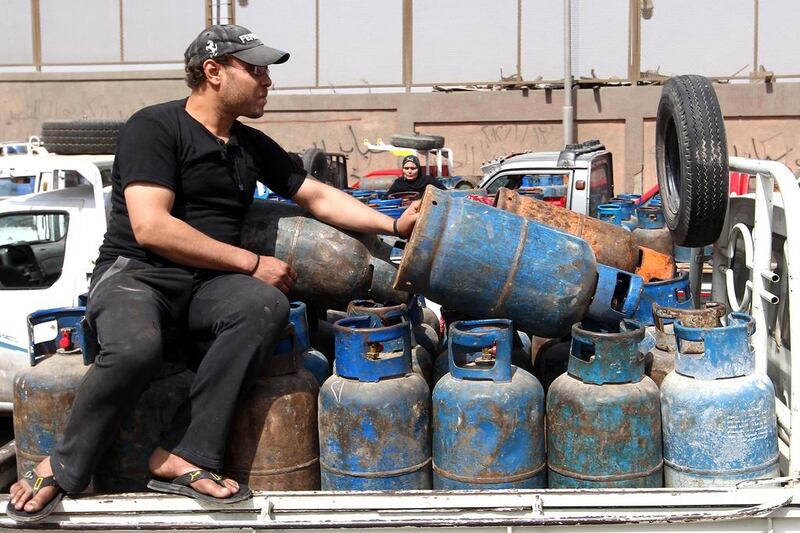Confidence is returning to the Egyptian economy, but the challenge of stagflation persists.
A recent purchasing managers’ index showed Egyptian output expanding for the first time in eight months – and for only the second time since 2012.
International investors are also showing signs of making a cautious return.
Bisco Misr, an Egyptian biscuit manufacturer, has attracted interest from a queue of corporate suitors weighing stakes in the company.
The private equity firm Abraaj Capital, the Saudi Arabian firms Savola Group and Halwani Brothers, the Egyptian diary firms Food Industries and Juhayna Food, and, most recently, Kellogg’s, the US breakfast giant, have all expressed interest.
And with PepsiCo and Almari announcing a US$345 million joint venture in the country, it looks like major international companies are keen to do business in Egypt once again.
Maya Senussi, an economist at the consultancy Roubini Global Economics, said that “anecdotal evidence would suggest some recovery in business confidence, and there’s definitely more talk of public share sales”.
“It’s early days but there are some signs Egypt is again on the investment radar, including for private equity acquisitions,” she said.
Foreign investors returned to the Egyptian Exchange (EGX) as net purchasers for the past three months, according to data from Bloomberg, in the longest continuous stretch since the toppling of Hosni Mubarak.
The influx of foreign funds “is one sign that foreign institutional investors may be increasing their exposure to Egypt”, said Jason Tuvey, an emerging markets economist at Capital Economics.
The EGX100, an index of the 100 most active equities on the EGX, has benefited, rising 28.8 per cent since the beginning of the year.
The Egyptian government has also begun to repay foreign energy producers, including the Abu Dhabi firms Dana Gas and Taqa.
“The problems with the energy sector have held back the economy of the past few years. Subsidies have increased while energy firms have not been investing,” Mr Tuvey said. This has slowed growth while pushing up government spending, and worsening the deficit.
Now that the Egyptian government is starting to pay off some of its debt to foreign energy companies, these firms were likely to start investing again, Mr Tuvey said.
Abu Dhabi National Oil Company announced at the beginning of this month that it would supply about $9 billion to the Egyptian General Petroluem Corporation to help Egypt cover its fuel import needs. But despite renewed corporate confidence, major stumbling blocks remain if the government of the president, Abdel Fattah El Sisi, is to get the Egyptian economy back on track.
“Egypt’s economy is still struggling and fits the definition of stagflation,” said Ms Senussi. “It faces a combination of economic stagnation, high inflation and unemployment.”
The country continues to pile debt because of successive fiscal deficits resulting from an expansion of its welfare spending and declining tax revenues. Egypt’s annual fiscal deficit, excluding grants from Arabian Gulf states, stood at 17.7 per cent of GDP at the end of June, according to the Economist Intelligence Unit.
GCC aid receipts cut Egypt’s deficit to 12 per cent, but its debt-to-GDP ratio stands at 90 per cent and rising, which makes it the world’s 19th-most indebted country.
This threatens to hold back recovery as the county’s domestic banks buy up sovereign debt rather than making loans.
Egypt has tapped domestic banks to sell its sovereign debt, but this means that the country’s retail banking sector could be on the hook if Egypt does not get public spending under control.
“[Egyptian] banks’ increasing holdings of government debt instruments reflect the growing ties between their solvency and that of [the Egyptian government],” said analysts at Bank Audi, headquartered in Lebanon.
Egyptian bank purchases of sovereign debt are definitely crowding out private investment, said Mr Tuvey. Bank deposits grew by 10.4 per cent last year, but loan issuance fell by 2.6 per cent.
Per capita growth remains anaemic, estimated at about 0.4 per cent this year, meaning that few will notice improvements to their living standards.
And inflation, which topped 11 per cent in July, is pushing up the cost of living for many of the approximately 65 per cent of the population living on less than $4 per day, according to World Bank data.
Mr El Sisi’s government is in a policy bind, needing to cut spending or raise taxes to reduce the deficit, but likely to hamper growth and stoke inflation by doing so.
Egypt has introduced a new property tax, levied a 5 per cent tax on individuals and corporations, and cut subsidies on natural gas and diesel in a bid to close the gap between revenues and spending, and reduce dependence on GCC aid.
While these measures may reduce the deficit, they are likely to push up inflation further as tax rises and input price increases filter through to consumers.
Negotiations on an IMF loan could pave the way for a longer-term solution to the country’s fiscal woes. However, that may not to be the chosen solution
“It’s a tough spot to be in but Sisi’s gone for a home-grown strategy, propped up by Gulf support, rather than opting for an IMF anchor,” said Ms Senussi.
“Sisi is doing something no one else before him dared to do – reducing the subsidies that are clogging the budget. This will be a slow adjustment, but it’s a start.”
abouyamourn@thenational.ae
Follow The National's Business section on Twitter





